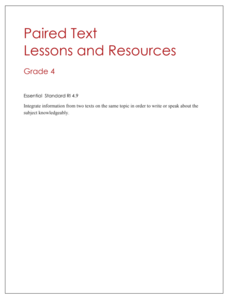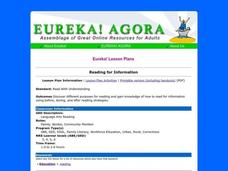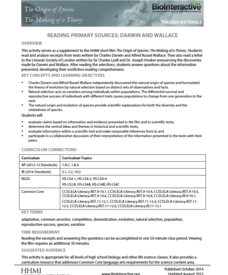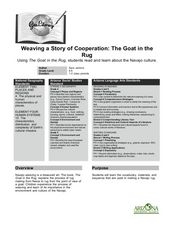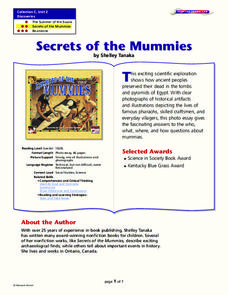Curated OER
Drawing Conclusions from Historical Fiction
Students read historical fiction. In this drawing conclusions lesson, students learn how to draw conclusions from text, specifically historical fiction. Students read Molly's Pilgrim and complete a graphic organizer where they answer...
Curated OER
Use Details from Text to Identify Cause and Effect, Draw Conclusions, Compare and Contrast
Third graders discuss research topics and write a paragraph on one of the provided questions. They focus on including key words from charts that the class has been compiling. They underline supporting details within the text they write....
Curated OER
Drawing Conclusions Lesson Plans
Teachers can use drawing conclusions lesson plans to help students learn how to connect their background knowledge to text.
Curated OER
Analyzing Two or More Nonfiction Texts
How does recognizing the author's purpose help you draw conclusions about a topic? Using two articles (both are attached), learners brainstorm why each author wrote each article. Are their purposes similar or different? Learners use a...
Pennsylvania Department of Education
Drawing Conclusions Based on Literary Elements
Learners compare versions of Cinderella and draw conclusions based on the story elements identified. In this literacy comprehension and story elements lesson plan, students read several versions of Cinderella, complete a "Comparing...
Curated OER
In Conclusion
Guide students on what reading comprehension and drawing conclusions really are. After discussing what they have learned and concluded from a short story, students read another story and work together to understand story details, and...
Washington Township Public Schools
Using Paired Text
Paired reading passages frequently appear on standardized exams, but finding text sets to use in the classroom is sometimes a challenge. A lesson plan on using paired texts includes a selection of passages and a graphic organizer for...
Curated OER
"Monsters Are Due on Maple Street" by Rod Serling
These questions ask learners to think about the text "Monsters Are Due on Maple Street" in a variety of ways. In addition to practicing reading comprehension, class members work on interpreting, making inferences and connections,...
Curated OER
Using Details from the Text
Explore non-fiction comprehension strategies with your class. They will visualize daily activities and label a 4 circle Venn diagram with related phrases. They must identify the overlapping sections as "main ideas," then complete a...
Polk Bros Foundation
I Can Identify/Infer Motive
Why do people and characters act as they do? Require your class figure out the motivation of two people or characters they read about in a given text. In the short charts, pupils note down who, what they do, and why they do it. After...
Curated OER
Drawing Conclusions-Miss Navajo
Students practice the higher order thinking skill of drawing conclusions. In this language lesson, students use the Miss Navajo pageant to discuss the role of language in selecting a winner. They view portions of the pageant, and try...
Read Works
How to Say “I Ruff You”
Who says you need a human to be your valentine on Valentine's Day? Give your dog-loving readers an inspiring perspective on how a sister givdes her brother a valentine from the family dog. They then answer 10 questions thatd involve...
Curated OER
Reading for Information
What should readers do to prepare for reading an informational text? What should they do during their reading? What should they do after completing such a text? Introduce your pupils to reading strategies and techniques to gain meaning...
Curated OER
Explicit Information versus Drawing Conclusions
Third graders identify explicit information and draw conclusions from text. In this instructional lesson, 3rd graders review models of each question type (explicit and conclusion) and practice reading a passage to answer questions.
Curated OER
Little Boy Blue
First graders read nursery rhymes and celebrate Mother Goose. For this drawing conclusions and predicting lesson, 1st graders create new ending for the nursery rhymes. Students gather data and make a graph showing their favorite rhyme.
School Specialty
The Tortoise and the Hare - Drawing Conclusions/Predictions Outcomes
Does the fastest one always win the race? Look deeper into The Tortoise and the Hare with a set of discussion questions for before, during, and after reading the story.
Curated OER
Writer's Toolbox
Present the class with a slide show that will give them a great head start in writing expository and narrative texts. The information is highlighted for easy note taking, well organized, and presented in a kid-friendly manner. It...
Howard Hughes Medical Institute
Reading Primary Sources: Darwin and Wallace
Take your classes back in time. Learners read real historical texts from both Darwin and Wallace as well as an announcement of their findings. Using guiding questions, they make inferences and draw conclusions from the information in the...
Curated OER
Weaving a Story of Cooperation: The Goat in the Rug
Weaving is an important part of Navajo culture. Read The Goat in the Rug to your fourth and fifth graders, and give them a glimpse into the process of rug making from the point of view of a goat! They will learn new vocabulary words and...
Curated OER
Secrets of the Mummies
How did the ancient people of Egypt preserve their dead so well that their bodies are still recognizable today? Learn the painstakingly complex process they used for preservation. Young scholars read and summarize a narrative detailing...
Curated OER
Recognizing Litter
When does trash become litter? Use this litter awareness lesson to help them understand the importance of trash disposal. Get learners engaged by reading Nancy Loewen's Lady Lulu Liked to Litter (not included). After discussing what...
EngageNY
Speech Writing: Identifying Criteria for a High Quality Conclusion
Learning is never-ending. Scholars learn about effective conclusions as they continue watching a video of an opinion speech. After analyzing the speech's conclusion, they work in small groups to write an ending for their own speeches.
Curated OER
Size It Up: Map Skills
Compare information from a US population cartogram and a standard US map. Learners draw conclusions about population density by analyzing census data a population distribution. They discover that census data is used to apportion seats in...
Curated OER
Predict, Draw Conclusions
Young scholars discuss times they predict what will happen next. They compare this to using the information given in a piece of literature to predict what will happen next in the story. Students listen as the teacher reads an excerpt...








